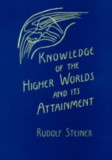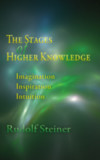Knowledge of the Higher Worlds
How Is It Achieved? (CW 10)
- Publisher
Rudolf Steiner Press - Published
15th November 2004 - ISBN 9781855841437
- Language English
- Pages 224 pp.
- Size 4.75" x 6.75"
Published in 1904 (CW 10)
Rudolf Steiner's foundational handbook for spiritual and personal development has grown more modern with time, though his methods remain clearly distinguishable from many current paths of inner work. First, Steiner's method is based on the clarity of thought normally associated with scientific research. Instead of denying clear thinking, his aim is to extend it beyond its present limitations. Second, Steiner recognizes—as do all genuine paths—that the way to spiritual experience is arduous and dangerous and calls for self-control in thought, word, and action. The human being comprises a unity, and we cannot develop knowledge without a corresponding development of feeling and will.
Steiner predicted that humanity would begin to experience a longing for forms of experience that transcended intellectual, materialistic thinking. More than a hundred years after the first publication of this book, countless means are offered for achieving transcendental experience, including Eastern meditation practices, channeling, remote viewing, and astral projection. Moreover, there has been a huge increase in the number of people who report various suprasensory perceptions, such as near-death experiences and meetings with angels. In this context, Steiner's key spiritual guidebook is needed more than ever, given its unique, precise instructions for inner training, its protective exercises, and its indications for staying grounded and centered. Knowledge of the Higher Worlds begins with the preconditions for personal development and guides the reader through the stages of initiation, its practical aspects, and its effects.
This volume is a translation from German of the written work Wie erlangt man Erkenntnisse der höheren Welten? (GA 10).
Rudolf Steiner
Rudolf Steiner (b. Rudolf Joseph Lorenz Steiner, 1861–1925) was born in the small village of Kraljevec, Austro-Hungarian Empire (now in Croatia), where he grew up. As a young man, he lived in Weimar and Berlin, where he became a well-published scientific, literary, and philosophical scholar, known especially for his work with Goethe’s scientific writings. Steiner termed his spiritual philosophy anthroposophy, meaning “wisdom of the human being.” As an exceptionally developed seer, he based his work on direct knowledge and perception of spiritual dimensions. He initiated a modern, universal “spiritual science” that is accessible to anyone willing to exercise clear and unbiased thinking. From his spiritual investigations, Steiner provided suggestions for the renewal of numerous activities, including education (general and for special needs), agriculture, medicine, economics, architecture, science, philosophy, Christianity, and the arts. There are currently thousands of schools, clinics, farms, and initiatives in other fields that involve practical work based on the principles Steiner developed. His many published works feature his research into the spiritual nature of human beings, the evolution of the world and humanity, and methods for personal development. He wrote some thirty books and delivered more than six thousand lectures throughout much of Europe. In 1924, Steiner founded the General Anthroposophical Society, which today has branches around the world.








